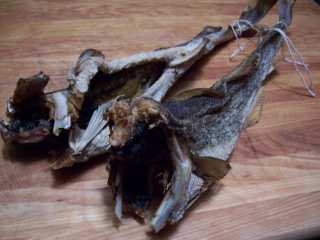 Mansa Musa, the "Lion of Mali." A great ruler of the 14th-century Empire of Mali.
Mansa Musa, the "Lion of Mali." A great ruler of the 14th-century Empire of Mali.This is a blog post that I have been planning for some time. In fact, I have been photographing meals for the past month and a half or so, and now I know that if the PhD does not work out, I have a backup profession: food stylist.
My dearest, imperatrix pulcherrima Africae occidentalis, is one of the Mandingo people of West Africa. Her family is from Liberia, but its origins are in Mali and perhaps she is a descendent of Mansa Musa. She has so many good qualities I have no hope of listing them all, but the one I would like to honor today is that she has introduced me to the food of her country, which she makes exquisitely.
West African cooking has a great deal of variety, but the basic premise is this: throw all the animals you can find into a pot with some water and very hot pepper. Stew it. That's about it. If you are a vegetarian who doesn't like spicy food, sorry. There's not much you can do. I will now describe three of the dishes, but I can't give you any specific recipes. It doesn't work that way. You throw things into a pot, that's about it.
Pepper Soup with Fufu
 This is the purest expression of the "throw it all in the pot" approach to gastronomy. In this case, we have chicken parts, stew beef, smoked turkey, and pork or lamb, I can't remember. Anything that walks, flies, swims or crawls can be added. Imperatrix pulcherrima Africae occidentalis will use shrimp when she makes it for others, but I'm allergic, so... You season the meat with salt, pepper, and bullion. Brown it in oil with chopped onion and hot pepper, then add water with bullion and stew it.
This is the purest expression of the "throw it all in the pot" approach to gastronomy. In this case, we have chicken parts, stew beef, smoked turkey, and pork or lamb, I can't remember. Anything that walks, flies, swims or crawls can be added. Imperatrix pulcherrima Africae occidentalis will use shrimp when she makes it for others, but I'm allergic, so... You season the meat with salt, pepper, and bullion. Brown it in oil with chopped onion and hot pepper, then add water with bullion and stew it.This is served with fufu: a majestic doughy ball of starch. Fufu flour is made with cassava or yams or plantains, etc. You mix it with water, form a big ball, and pour the stew over it. Filling and delicious, it is a meal that asserts itself with authority and dedication. Imperatrix pulcherrima Africae occidentalis often makes it for us when we are sick, since it combines the healing properties of chicken soup with the skin pore-opening and nasal passage-clearing effect of hot pepper.
Spinach and Rice
 I have made pepper soup before, but now we are moving onto things I have only eaten, so my knowledge of the cooking process is a bit more shaky. As you can tell from the variety of meat here, once again we are following a "kill them all" approach to the barnyard. This dish is prepared in a similar fashion to pepper soup, only with less water and the addition of chopped spinach and palm oil at the end. It is served on top of a healthy serving of white rice. Pepper soup can also be served with rice instead of fufu; chez nous we serve it in another bowl on the side. You need some kind of starch because it is very spicy.
I have made pepper soup before, but now we are moving onto things I have only eaten, so my knowledge of the cooking process is a bit more shaky. As you can tell from the variety of meat here, once again we are following a "kill them all" approach to the barnyard. This dish is prepared in a similar fashion to pepper soup, only with less water and the addition of chopped spinach and palm oil at the end. It is served on top of a healthy serving of white rice. Pepper soup can also be served with rice instead of fufu; chez nous we serve it in another bowl on the side. You need some kind of starch because it is very spicy.Fishballs!
 This made Lenten Fridays much less penitential. I was not allowed to follow the making of the secret fishballs, but I know it involved bluefish, kingfish, chopped onions and peppers, flour and very hot oil. The sauce you see has something to do with tomatoes and onions. As I said, it was a secret. The fishballs were gloriously spicy and flavorful.
This made Lenten Fridays much less penitential. I was not allowed to follow the making of the secret fishballs, but I know it involved bluefish, kingfish, chopped onions and peppers, flour and very hot oil. The sauce you see has something to do with tomatoes and onions. As I said, it was a secret. The fishballs were gloriously spicy and flavorful.I'm not a great fan of fish usually, but imperatrix pulcherrima Africae occidentalis has a gift with seafood. She also makes a non-African fish stew that I can't get enough of.
Ingredients
 The peppers are essential. We get what are called here in New York "Jamaican peppers," available in supermarkets in neighborhoods with a sizeable Latino population. Accept no substitutes. These peppers have a superb flavor and have powerful spice magic. One or two is enough to make a pot of pepper soup that can make a whole family sweat.
The peppers are essential. We get what are called here in New York "Jamaican peppers," available in supermarkets in neighborhoods with a sizeable Latino population. Accept no substitutes. These peppers have a superb flavor and have powerful spice magic. One or two is enough to make a pot of pepper soup that can make a whole family sweat.I buy fufu flour at a store in "Little Senegal" on 116th Street, but it can be found in surprising places (imperatrix pulcherrima Africae occidentalis actually found it in a store in Salt Lake City). Google it and you can probably find it online. The same goes for palm oil, thick, red, oily and flavorful.
Everything else is pretty standard.
I have to admit there are parts of West African cuisine that I'm not so crazy about. Imagine a nuclear warhead detonates over a lake. You walk the dry lakebed and find the radioactive remains of the fish that once swam peacefully in its now-vaporized waters. You can find this fish in African stores. I refer to it as "post-apocalyptic death fish." It has a strong flavor, and I really don't like it.

Post-apocalyptic Death Fish
(I should say that imperatrix pulcherrima Africae occidentalis does not agree at all with my characterization of the aforementioned Death Fish. She insists that I explain that it is actually smoked with herbs and peppers, and tastes "wonderfully delicious." She says one should think of it as fish jerky. I will let the reader decide.)

7 comments:
Now I'm hungry.
Man, you had me salivating until that last shot. :-)
The yams are key. The yams go with everything.
Nice photos! Sadly, I'm a vegetarian so I'd starve in Mali
I was married for a year to a Japanese, and learned some new foods ... nori, mochi, hoshigaki, fugu ... :-)
It sounds great! I've always had to force myself to "eat my veggies." I do wish the world would figure out how to spare animals when it's no longer necessary to consume them to survive. Meanwhile... cuisine consisting mainly of a variety of meats is exactly what I'd want to eat!
Great. I am going to save this post for a later in-depth reading and possible inspiration. I love to cook and usually I use a lot of herbs, onion, garlic and pepper to cook meat. Thanks Liam.:-).
Hi Liam,
The "throw it all in the pot" is the way I cook too. I also use onion in almost every Iraqi or non-Iraqi recipe. Add garlic to the ingredients and you have the best food. Well, maybe for me :-)
I may try some of these recipes. They're yummy.
I'm glad everyone liked the post. Sorry to the vegetarians -- like I said, not much to be done about that.
There is very little that I cook that does not involve garlic.
Post a Comment